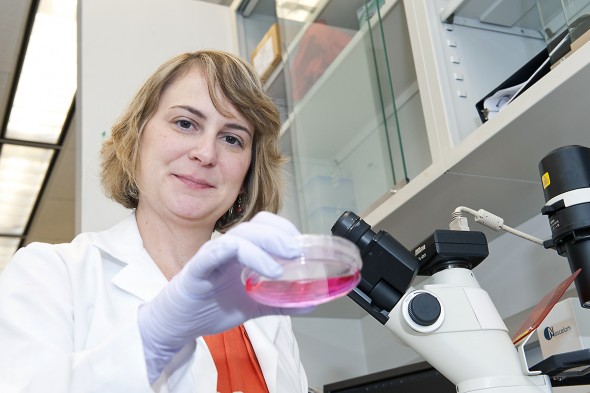Working to prevent ovarian cancer
The Researcher of the Year award recognizes 10 UIC scientists who are advancing knowledge in their fields. The Distinguished Researcher Award honors five researchers with a record of outstanding achievement. The Rising Star Award honors early career researchers who show promise as future leaders.
Ovarian cancer is the fifth leading cause of cancer-related death among women and the deadliest of gynecologic cancers.
Preventing ovarian cancer may one day be possible — and if it is, Joanna Burdette may be at the forefront of the discovery.
Before the cancer can be treated, researchers must find where the tumors begin. Burdette, associate professor of medicinal chemistry and pharmacognosy in the College of Pharmacy, is conducting research to discover how cells of the Fallopian tubes are transformed into ovarian cancer.
“One of the most confounding issues of ovarian cancer is the concept that the epithelial subtype responsible for the disease is still not completely known,” Burdette said.
Using three-dimensional cell cultures developed in her laboratory, Burdette is investigating how cells become cancerous and whether molecules produced in the ovary are part of the process.
Ovulation and the Fallopian tube’s location near the ovary may contribute to ovarian cancer, she said, by spurring cell growth, stimulating cell-signaling pathways in response to pituitary hormones and by damaging the DNA.
Burdette, who completed her Ph.D. at UIC in 2003 before completing postdoctoral fellowship at Northwestern University, has published more than 40 papers and received 17 grants since joining the UIC faculty.
She was a UIC National Institutes of Health BIRCWH (Building Interdisciplinary Research Careers in Women’s Health) scholar and received the Tilberis Early Career from the Ovarian Cancer Research Fund.
She serves on the Committee for Experimental Medicine of the Gynecologic Oncology Group and the Publication Core Committee of the Endocrine Society.
Burdette’s research is funded by the American Cancer Society, the U.S. Department of Defense, the Ovarian Cancer Research Fund and the National Cancer Institute.

